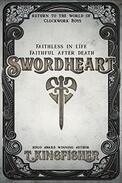
| Publisher: | Argyll |
| Copyright: | November 2018 |
| ISBN: | 1-61450-463-6 |
| Format: | Kindle |
| Pages: | 417 |
This is an ebook, so metadata may be inaccurate or missing. See notes on ebooks for more information.
(Content note: Some discussion of suicide.)
Swordheart is set in the same fantasy world as Clockwork Boys and The Wonder Engine and a little later than those books, so it contains mild spoilers for some of their plot. But it's not a sequel, and is quite readable on its own.
It was almost exactly a year ago from the time of this writing that my husband and I were in the kitchen and I was ranting about how much Elric — Michael Moorcock's Elric — whined about everything. "If you ask me," I said, "the real victim was his sword Stormbringer. The sword had to listen to him whine and couldn't leave. But does anybody ever ask the magic sword's opinion? Noooo."
This is from the author's note by T. Kingfisher (aka Ursula Vernon) at the end of the book, but I think it's the perfect introduction (although in this case the sword does more of the whining than the wielder).
At the start of the book, Halla has inherited a substantial estate. This is doing her no good, given that she's locked in a room on that estate by her relatives, whose solution to her unexpected inheritance of her uncle's property is to try to force her to marry her cousin and thus hand that inheritance back over to him. The only way Halla sees out of this situation is to kill herself. Conveniently, there's a large sword among the clutter in the room in which she's trapped.
To say that the sword disagrees strongly with this plan is an understatement.
Sarkis is the sword in question. Or, to be more precise, Sarkis is bound inside the sword in question, summoned whenever the wielder of the sword draws the blade. He's also bound to protect the wielder of the sword, built like a tank, and more than capable of defending Halla against her relatives and their hired guard. Reaching a mutual agreement on this point with Halla is considerably harder, given their entirely non-overlapping frames of reference and Halla's uncanny ability to derail almost any conversation with endless questions.
Escaping Halla's home is the prelude to a quest to get Halla's rightful inheritance back, one that eventually also entangles a lawyer-priest and a gnole. It's also the beginning of a romance that readers of The Wonder Engine will find somewhat familiar. Sarkis is not exactly a paladin and Halla is nothing like Slate, but the romance follows a similar halting dynamic with extensive internal monologues (and some mutual incomprehension). This romance is further complicated by Sarkis's own secrets.
The romance once again didn't quite work for me. The attraction is primarily physical at first, and I wasn't sure what Halla sees in Sarkis. He's not quite as intense on the self-pity as Caliban, but he has some similar tendencies, and the resolution of his deep secrets struck me as unnecessarily melodramatic. The romance also has some irritating periods of the two of them not talking to each other.
The rest of the book, though, is great. Kingfisher's gnoles continue to delight with their quiet judgment of humans, occasional aphorisms, and determined ability to stick to gnole business. The plot has a tendency to roll on the random encounter table from time to time, but it moves right along, includes some enjoyable twists, and has a satisfying ending. But the true highlight of the book is Halla.
The first few chapters establish Halla's runaway train of thought, which leaps from topic to topic and chases odd ideas across the furniture and down into burrows. The contrast with Sarkis's semi-formal seriousness is a great bit of mood-setting humor. But Halla goes much deeper than that. Over the course of the book, Kingfisher makes clear that Halla's leaps of logic and distracting questions are both personality and a deliberate tactic, one carefully designed as protective camouflage in more ways than one. It's beautifully done and, alongside Halla's practical competence and willingness to grapple with any idea, makes her just as capable as any other character in the story, just along an entirely different axis than fighting or wielding authority. It's also a bit like reading a fantasy novel with running commentary from someone who is both mostly unflappable and intensely curious about everything.
(And yes, it's hard not to read a lot of Halla's lines in the same voice as Ursula Vernon's Twitter posts.)
This is a delightful sword and sorcery novel with some real depth of characterization. It's also a bit lighter than The Wonder Engine, which matches what I was in the mood for. I had some trouble with both the romance and the melodrama of the last major plot challenge, but it kept me happily turning the pages. Recommended.
Swordheart is complete on its own, although Kingfisher says in her author's note that it's likely to be the first book of a trilogy.
Reviewed: 2019-12-23